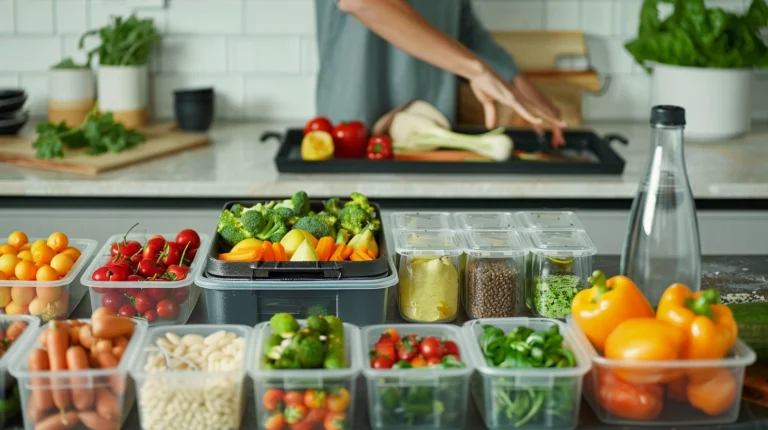Indulge & Slim Down: How To Lose Weight when You Love Food
Embracing mindful eating and making healthier food choices have been essential in my journey to losing weight while still cherishing my love for food. But what if there was a way to enjoy your favorite dishes without the guilt and restriction?
Read on for my practical strategies to help you balance weight loss and culinary delights, paving the way for a sustainable and fulfilling lifestyle transformation.
Key Points
- Prioritize nutrient-dense foods for satisfaction and weight loss.
- Practice portion control to enjoy favorite foods in moderation.
- Incorporate mindful eating to savor each bite and prevent overeating.
- Find balance between indulgence and nutrition for successful weight management.
- Listen to hunger cues and stop eating when satisfied to maintain weight loss goals.
Mindful Eating for Weight Loss
Mindful eating transforms the way I approach food, fostering a deeper connection with my meals and promoting healthier choices. Throughout my weight loss journey, practicing mindful eating has been a game-changer. By savoring each bite and fully engaging with the sensory experience of eating, I’ve found a newfound appreciation for the nourishment my meals provide.
This approach hasn’t only helped me make better food choices but has also curbed my tendency to overeat. Developing a more mindful relationship with food has allowed me to enjoy my favorite meals without the burden of guilt, promoting a healthier attitude towards eating.
Embracing mindful eating hasn’t only been beneficial for my weight loss goals but has also improved my overall well-being.
Balancing Indulgence and Nutrition
Finding the right balance between indulging in favorite treats and prioritizing nutrient-rich foods is essential for successful weight management without feeling deprived. To achieve this balance, practicing portion control, making healthier choices, and incorporating mindful eating are key strategies.
By being mindful of what and how much we eat, we can enjoy our favorite foods in moderation while still working towards weight loss goals. I find that having a variety of options in my meals allows me to feel satisfied and prevents any feelings of restriction.
Below is a table summarizing how portion control, healthier choices, and mindful eating contribute to a balanced approach to food:
| Strategies | Benefits |
|---|---|
| Portion Control | Helps in managing caloric intake |
| Healthier Choices | Provides essential nutrients for the body |
| Mindful Eating | Promotes awareness and prevents overeating |
Prioritizing Nutrient-Dense Foods
To successfully prioritize nutrient-dense foods for weight loss, focus on incorporating a variety of fruits, vegetables, lean proteins, and whole grains into your daily meals. When choosing foods, opt for nutrient-packed options that support your weight loss journey.
Here are three key reasons why prioritizing nutrient-dense foods is essential:
- Nutrient-dense foods provide essential vitamins and minerals while being lower in calories, making them ideal for weight loss.
- These foods offer more health benefits compared to empty-calorie options, helping you feel full and satisfied while supporting your weight loss goals.
- Incorporating nutrient-dense foods into your diet can help you achieve your desired weight without compromising on taste or enjoyment. Start making small changes today to prioritize these beneficial foods for a healthier you.
Enjoying Moderation in Eating

When it comes to enjoying moderation in eating, I find that practicing mindful habits like savoring each bite and focusing on flavors truly enhances the dining experience.
Portion control tips can be helpful in preventing overeating while still indulging in favorite foods.
Making flavorful, healthy choices allows me to satisfy cravings without compromising my weight loss goals.
Mindful Eating Habits
Savoring each bite and appreciating flavors while eating slowly enhances the experience of food, promoting mindful consumption and healthier eating habits. When practicing mindful eating, I find that I naturally steer clear of overeating and emotional eating episodes.
Here are three key aspects that have helped me embrace mindful eating habits:
- Listening to Hunger Cues: By tuning into my body’s signals, I stop eating when satisfied, preventing overindulgence.
- Engaging the Senses: Noticing textures, aromas, and flavors enriches the meal experience, leading to greater satisfaction.
- Enhanced Well-Being: Mindful eating fosters better digestion, nutrient absorption, and an overall sense of wellness.
Embracing these practices has transformed my relationship with food for the better.
Portion Control Tips
Embracing moderation in eating through effective portion control is key to maintaining a healthy relationship with food and achieving weight management goals.
When it comes to portion control, making small changes can have a big impact on your overall health. Using smaller plates tricks your mind into perceiving larger portions, helping you feel satisfied with less food. Measuring out servings of your favorite dishes prevents overeating by providing a visual cue of how much you’re consuming.
Chewing food slowly and mindfully allows you to savor each bite, enhancing the eating experience and promoting a feeling of fullness. Keep in mind to focus on the taste, texture, and smell of your food to practice mindful eating, and stop when you feel comfortably full, even if there’s food left on your plate.
Flavorful Healthy Choices
Indulging in a variety of flavorful, nutrient-rich foods is essential for enjoying moderation in eating and maintaining a healthy balance in your diet. To make healthy choices more enjoyable and satisfying, consider the following:
- Choose Flavorful Additions: Incorporate herbs and spices to enhance the taste of your meals without piling on extra calories.
- Add Colorful Fruits and Vegetables: Include a range of colorful fruits and vegetables in your diet to add sweetness and crunch while providing essential vitamins and minerals.
- Opt for Healthy Cooking Methods: Use techniques like grilling, baking, or steaming to retain the flavor and texture of your food without the need for excess oils or fats.
Listening to Hunger Cues
When I make food choices, I pay close attention to my physical hunger cues like stomach growling or feeling light-headed. By tuning into these signals, I can differentiate between actual hunger and emotional cravings.
This practice of mindful eating helps me eat more consciously, savoring each bite and giving myself time to assess my hunger levels between bites. I aim to stop eating when I feel satisfied, not overly full, using a hunger scale from 1 to 10 to gauge my hunger levels before and after meals.
Being in tune with my body’s signals allows me to enjoy food while also being mindful of when to eat and when to stop, helping me maintain a healthy balance.
Savoring Each Bite
Savoring each bite while eating allows me to fully appreciate the flavors, textures, and aromas of my food, enhancing my overall enjoyment of the meal.
To make the most of this experience, I practice mindful eating by:
- Engaging my senses: By focusing on the taste, smell, and feel of each bite, I find greater satisfaction in my meals.
- Slowing down: Taking my time to savor each bite helps me recognize when I’m truly satisfied, preventing overeating.
- Promoting healthier habits: Research suggests that savoring food can reduce the tendency to overeat and encourages a more balanced approach to eating.
Incorporating Physical Activity
To enhance my weight loss journey, I incorporate physical activity as an essential component to burn calories and improve my metabolism. Regular exercise routines play an important role in weight management and overall health.
Activities like walking, running, cycling, or strength training contribute greatly to calorie expenditure, aiding in achieving weight loss goals. Not only does exercise help in burning calories, but it also boosts mood, reduces stress, and enhances energy levels, which are all essential for supporting weight loss efforts.
Finding Sustainable Weight Loss Strategies
When it comes to finding sustainable weight loss strategies, it’s all about making healthy food choices, practicing portion control, and adopting mindful eating practices.
By focusing on nutrient-dense foods, using smaller plates, and savoring each bite, you can enjoy your favorite foods while working towards your weight loss goals.
Planning meals ahead and seeking support from professionals can help align your love for food with your desire for a healthier lifestyle.
Healthy Food Choices
In my journey towards sustainable weight loss, I prioritize incorporating whole, nutrient-dense foods for lasting results. When making healthy food choices, I focus on:
- Fiber and Protein-Rich Foods: Opting for foods high in fiber and protein helps me feel full and satisfied, reducing the temptation to overeat. This includes fruits, vegetables, lean proteins, and whole grains.
- Portion Control: Practicing mindful eating and portion control allows me to enjoy my meals while managing caloric intake effectively. Being aware of portion sizes helps me maintain a healthy balance.
- Hydration with Water-Rich Foods: Choosing water-rich foods like fruits and vegetables not only supports weight loss efforts but also contributes to overall health. Prioritizing hydration through food choices is a key part of my weight loss strategy.
Portion Control Tips
Prioritizing mindful portion control is essential in developing sustainable weight loss strategies. When it comes to managing portion sizes and calorie intake, there are practical tips that can help you stay on track while still enjoying your favorite foods.
Here are some simple yet effective portion control tips:
| Portion Control Tips | Benefits |
|---|---|
| Use smaller plates | Naturally reduce portions |
| Measure out servings | Maintain balance |
| Opt for pre-portioned snacks | Prevent overindulging |
| Be conscious of restaurant portions | Manage intake effectively |
| Split meals or take leftovers home | Control portion sizes |
Mindful Eating Practices
Engaging in mindful eating practices fosters sustainable weight loss strategies by promoting awareness of food sensations and fostering a healthy relationship with eating. Mindful eating involves paying attention to the taste, texture, and experience of food to promote satisfaction and prevent overeating.
Here are three ways it can benefit weight management and food enjoyment:
- Recognizing Hunger Cues: By being in tune with your body, you can distinguish between true hunger and emotional triggers, leading to better food choices and portion control.
- Savoring Each Bite: Eating slowly and mindfully allows you to enjoy your food more fully, leading to feeling satisfied with smaller portions and reducing the temptation to overeat.
- Enhanced Self-Awareness: Practicing mindful eating can help curb mindless snacking, support a balanced approach to food enjoyment, and contribute to long-term weight management goals.
Avoiding Deprivation and Restrictions
Keeping in mind a balanced approach to weight loss can foster a positive relationship with food and support long-term success. Restrictive diets often lead to feelings of deprivation, triggering binge eating and hindering weight loss efforts.
By embracing moderation and balance, you can enjoy your favorite foods while still making progress towards your weight goals. Deprivation and restrictions can set off emotional eating patterns that sabotage long-term success.
Sustainable weight loss is achievable through mindful eating, portion control, and overall balance without extreme deprivation. It’s important to find harmony between enjoying food and nourishing your body, rather than strict rules that make you feel restricted.
Creating Harmony in Food Choices
To achieve harmony in food choices, focus on incorporating a variety of colorful fruits, vegetables, and high-fiber beans into your meals for ideal nutritional balance.
Here are three simple steps I use to make small yet impactful changes to my diet while still enjoying the foods I love:
- Add Color: Incorporating a rainbow of fruits and vegetables not only makes your meals visually appealing but also guarantees you’re getting a wide range of essential nutrients.
- Choose Whole Grains: Opt for whole grains like brown rice or quinoa to increase fiber intake, keeping you fuller for longer and supporting your weight loss goals.
- Opt for Lean Proteins: Select lean meats, skinless poultry, or seafood to reduce calorie and fat intake, making healthier choices without sacrificing flavor.
Embracing a Balanced Approach
When it comes to weight loss, finding a balanced approach is key. By practicing mindful eating habits, like savoring each bite and paying attention to hunger cues, you can enjoy your favorite foods guilt-free.
Incorporating portion control and opting for nutrient-dense choices can support your weight loss journey while still allowing for occasional indulgences.
Mindful Eating Habits
Embracing a balanced approach to mindful eating habits can revolutionize how we engage with food, enhancing satisfaction and promoting healthier relationships with what we consume. When practicing mindful eating, incorporating these habits can make a significant difference:
- *Savor each bite*: By fully experiencing the taste, texture, and aroma of your food, you can derive more pleasure from each meal.
- *Chew slowly*: Taking the time to chew your food thoroughly not only aids digestion but also allows you to appreciate the flavors and feel more satisfied.
- *Be present during meals*: Avoid distractions like screens or work to focus on the act of eating. Being mindful can help you tune into your body’s hunger signals and promote better portion control.
Portion Control Tips
Shifting focus towards portion control involves consciously choosing to be mindful of how much food I put on my plate. Using smaller plates is a simple yet effective strategy to control portion sizes and prevent overeating.
By measuring out servings of high-calorie foods, I can better manage my intake and make informed choices. Practicing mindful eating allows me to savor each bite, pay attention to hunger cues, and fully enjoy my meals.
Opting for nutrient-dense foods helps me feel satisfied with smaller portions, promoting a balanced approach to eating. Avoiding distractions during meals is key to preventing mindless overeating and staying attuned to my body’s signals.
Embracing portion control in combination with mindful eating can lead to healthier habits and sustainable weight management.
Healthy Indulgence Options
Opting for healthier indulgence options allows me to satisfy cravings without compromising my commitment to balanced eating. When I’m looking for a guilt-free treat, I turn to:
- Dark Chocolate: Indulging in dark chocolate not only satisfies my sweet tooth but also provides a dose of antioxidants that can benefit my heart health.
- Greek Yogurt with Fresh Berries: Enjoying a bowl of Greek yogurt topped with fresh berries gives me a creamy and satisfying snack rich in protein, probiotics, and essential nutrients.
- Air-Popped Popcorn: For a low-calorie and fiber-rich munching option, I love seasoning air-popped popcorn. It’s a guilt-free way to snack while staying on track with my health goals.
Shifting Mindset on Food
When it comes to food, my mindset has evolved from restricting to savoring. Understanding that food enjoyment doesn’t have to lead to overeating has been key in my weight loss progress.
By shifting my focus to savoring the flavors and textures of food, I’ve learned to appreciate meals without feeling the need to overindulge. Loving food doesn’t have to hinder my journey towards a healthier weight.
Embracing this new perspective hasn’t only allowed me to enjoy what I eat more fully but has also supported sustainable weight loss. Learning to savor and appreciate food for its taste and nourishment rather than using it as a coping mechanism has been transformative in my approach to eating.
Nourishment Over Emotional Comfort
When it comes to nourishing my body, I prioritize whole, nutrient-dense foods over seeking emotional comfort through eating.
By focusing on the nutritional value of my meals, I can better support my health and weight loss goals.
Making mindful choices that benefit my well-being is key in viewing food as fuel for my body rather than just for emotional satisfaction.
Food as Fuel
Viewing food as essential nourishment for the body rather than a source of emotional comfort is crucial for prioritizing nutrition over comfort eating. When we focus on food as fuel, we can make healthier choices that support our overall well-being. Here are three key points to keep in mind:
- Understanding Nutritional Value: Knowing the nutrients in our food helps us choose options that provide the energy and nourishment our bodies need.
- Differentiating Emotional Eating: Recognizing the reasons behind our food choices can help us distinguish between eating for comfort and eating for sustenance.
- Choosing Nutrient-Dense Foods: Opting for foods rich in essential nutrients can fuel our body’s functions and support our weight loss goals.
Mindful Eating
Mindful eating prioritizes nourishing the body over seeking emotional comfort through food. It involves savoring each bite, appreciating flavors, textures, and the entire eating experience.
By being present during meals, you can better recognize genuine hunger signals and differentiate them from emotional triggers. This practice allows you to enjoy your favorite foods without overindulging or feeling guilty afterward.
Studies indicate that mindful eating contributes to improved weight management, better digestion, and a reduction in binge eating incidents. Embracing this approach not only helps in maintaining a healthy weight but also fosters a positive relationship with food.
Healthy Swaps
To keep in mind healthier choices and prioritize nourishment over emotional comfort, consider opting for nutrient-dense alternatives in your daily meals and snacks. When aiming to lose weight while enjoying food, making smart swaps can make a significant difference.
Here are three swaps to help you on your journey:
- Choose Greek yogurt with berries over sugary yogurt with fruit to support weight loss and reduce the risk of high blood pressure.
- Opt for air-popped popcorn seasoned with herbs and spices instead of processed granola bars to cut down on calories and improve your overall health.
- Prioritize roasted vegetables drizzled with olive oil rather than high-sugar barbecue sauce for a flavorful and healthier option.
Keep in mind, small changes like these can add up in your food diary and contribute to your weight loss goals.
Long-Term Success Tips
To achieve long-term success in weight loss, it’s essential to shift focus towards developing a healthy relationship with food rather than solely following strict dieting rules. Mindful eating plays an important role in this journey by helping you savor each bite and tune into your body’s hunger cues.
It’s also important to incorporate regular physical activity that you enjoy, as it not only supports your weight loss efforts but also boosts your overall well-being. Seeking professional guidance and support can provide you with a sustainable plan tailored to your needs, making it easier to navigate your weight loss journey while still enjoying food.
Don’t forget to celebrate small victories along the way to stay motivated and focused on your goal.
Indulging Without Guilt
Indulging in your favorite foods guilt-free is an essential aspect of maintaining a positive relationship with food while working towards weight loss goals. When practicing mindful eating, it’s possible to enjoy your favorite treats without feeling guilty.
Here’s how indulging without guilt can support your weight loss journey:
- Mindful Eating: By savoring each bite and being present during meals, you can enjoy your favorite foods fully and feel more satisfied.
- Increased Satisfaction: Indulging in moderation and savoring your treats can lead to better satisfaction, reducing the likelihood of succumbing to cravings later on.
- Craving Control: Balancing indulgences with healthier choices can help manage cravings, making it easier to stick to your weight loss plan while still enjoying delicious foods.






